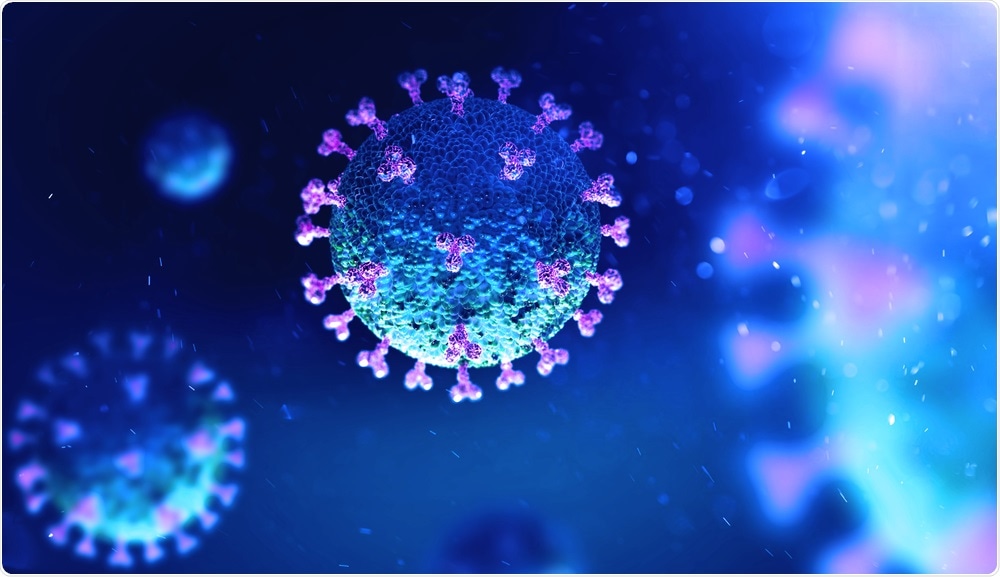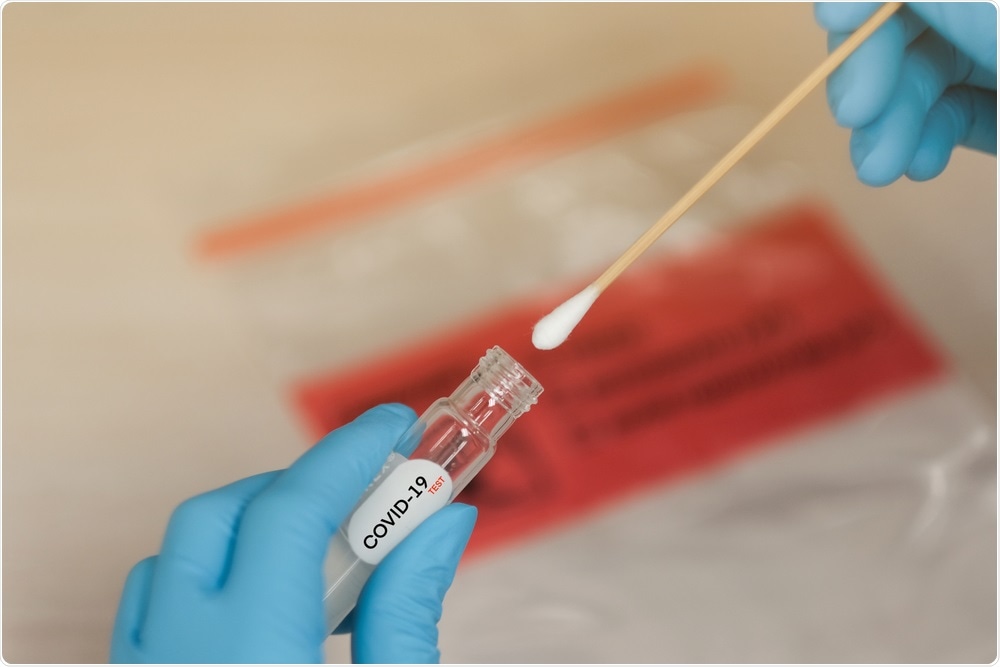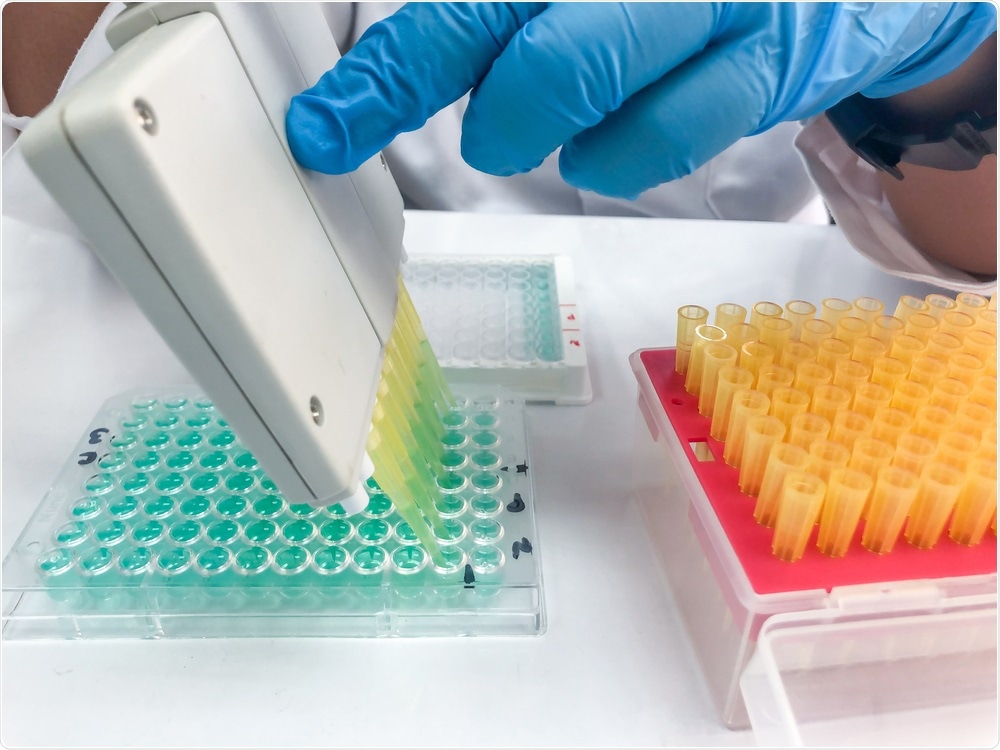In this interview, Dr. Yinan Jiang discusses ACROBiosystems' efforts in the fight against COVID-19 and the search for a vaccine
How has ACROBiosystems been involved in the fight against COVID-19?
ACROBiosystems was founded in 2010, and we are a leading manufacturer of recombinant proteins and other critical reagents to support the development of target therapeutics. ACROBiosystems is dedicated to accelerating the process of target therapeutic drug development from the starting point of target identification to the endpoint of a clinical trial.

Image Credit: Andrii Vodolazhskyi/Shutterstock.com
ACROBiosystems has served over 4,500 customers from over 60 countries and reached out to 20,000 end users from pharmaceutical companies and academic institutes. We have established long-term collaborations with big pharms, such as Pfizer, Novartis, and Johnson & Johnson, and well-known academic institutes, like NIH. ACROBiosystems has set up workspaces in Beijing, Shanghai, and Hangzhou in China, and offices in Boston, San Jose, and Newark in the U.S.
The COVID-19 pandemic is caused by the emerging coronavirus, SARS-CoV-2, and it presents a serious global public health emergency. In addition to the health damage caused by this pandemic, COVID-19 has had a huge impact on our daily life.
ACROBiosystems responded to the outbreak of COVID-19 in China quickly, finishing the design of initial SARS-CoV-2 antigen products during the Chinese Spring Festival, before immediately starting to produce the antigen map. So far, we have launched over 100 SARS-CoV-2 antigen and antibody products and have some products under development.
The majority of these products are antigens, including full-length trimeric Spike protein, S1, RBD, Nucleocapsid, Envelope, and NSPs. ACRO has worked hard to develop products that can be used in antigen testing and antibody testing development.
Besides high-quality protein products, we have developed 25 antibodies related to S1, RBD, S-NTD, N protein, etc.; 6 kinds of magnetic beads pre-coupling with S1, RBD, N, ACE2 proteins and antibodies; 13 antigen or antibody titer assay kits which can be used in drug screening or diagnostics. Some of the antibody titer assay kits are under the progress of CE certificating.
ACROBiosystems has developed a comprehensive line of critical reagents covering all targets of SARS-CoV-2. We hope that we can help to accelerate the research and development of SARS-CoV-2 related therapeutics, diagnostics, and vaccines with these high-quality products and advanced technical support.
Next Generation Dx Virtual Interactive Global Summit 2020
What sort of methods are currently being used for the diagnosis of SARS-CoV-2?
There are three types of SARS-CoV-2 diagnoses: molecular testing, antigen testing, and antibody testing. The application of each of these three methods is slightly different, and each has its advantages and disadvantages.
Molecular testing is typically highly accurate and can be used to diagnose active coronavirus infections, but this test requires equipment and laboratories to conduct the experiment, and it usually takes from one to three days to get the results. Antigen tests can be used to diagnose acute infections, and it takes 15 to 30 minutes to get the results, but these tests sometimes give a false negative outcome. Antibody tests can show if you have been infected by this virus in the past, providing results as quickly as the antigen test. However, the antibody test cannot diagnose active infections at the time of the test or confirm that you do not currently have COVID-19.

Image Credit: Horth Rasur/Shutterstock.com
A SARS-CoV-2 vaccine is expected to be launched at the end of this year. When this happens, people who have been vaccinated will have anti-SARS-CoV-2 antibodies in their body, and the antibody test will not be able to diagnose whether they have been affected by SARS-CoV-2. The molecular test and the antigen test will therefore be the main diagnosis methods for testing acute infections of SARS-CoV-2.
17 SARS-CoV-2 antibody detection tests are currently approved by the FDA. However, only two SARS-CoV-2 antigen detection tests - produced by BD and Quidel - have received emergency use authorization. In my opinion, more antigen tests will be approved by the FDA in the next few months.
How has ACROBiosystems developed anti-SARS-CoV-2 antibodies for use in antigen and antibody test development?
As well as biotinylated SARS-CoV-2 antigen products, ACROBiosystems has also collaborated with its partners to develop anti-SARS-CoV-2 antibodies. We used our high-quality SARS-CoV-2 antigen products to immunize 10 mice with anti-SARS-CoV-2 antibodies. Taking advantage of the ELISA assay, we conducted regular screening of antibodies and selected the candidates that had a high binding affinity towards SARS-CoV-2 antigens.
Next, we utilized an SPR assay to measure the KD value for each antibody and to map the epitope of these antibodies. We categorized the antibodies into six groups, and in each group, the antibody will compete with the others in the antigen-binding. After further screening, we selected five anti-N protein antibodies and four NG S1 antibodies which our customers can use to develop antigen tests.
We also tested the sensitivity of each antibody pair in ELISA and the LFE assays, but we are not yet sure if these antibody pairs can support our customers’ R&D platforms.
We found that the NUN-S46 and NUN-S47 antibody pair displayed a sensitivity for detecting nucleocapsid protein with 50 pg in our LFAassay, and 12 pg/mL in our ELISA assay, respectively. We tested the species specificity of this antibody pair and found that the NUN-S46 and NUN-S47 antibody pair can only recognize SARS-CoV-2 nucleocapsid protein, but not nucleocapsid protein for other coronaviruses.
Similarly, we also measured the sensitivity for detecting S1 protein using the S1N-M12A1 and S1N-M13A1 antibody pair. The sensitivity, in this case, was 200 pg in our LFA assay, and 200pg/mL in the ELISA assay, respectively. This antibody can only recognize SARS-CoV-2 S1 protein, but not S1 protein from other coronaviruses.

Image Credit: AnaLysiSStudiO/Shutterstock.com
To facilitate serological test development ACROBiosystems has launched both anti-SARS-CoV-2 as an IgG and IgG1 antibodies. SAD-S35 is isolated from SARS-CoV-2 infected patients, and it combines an S1 protein with a sensitivity of 0.1 nanograms per milliliter.
SPD-M141 is a chimeric antibody, combining the constant domains of the human IgG molecules in the mouse variable regions. It can bind to S1 proteins with a sensitivity of 0.2 milligrams per milliliter in LFA assays. The sensitivity of this antibody is one milligram.
In summary, ACROBiosystems has developed a SARS-CoV-2 antigen and antibody products specifically designed and optimized for serological test development. Spike-derived proteins are produced from HEK293 cells, while nucleocapsid proteins are either yielded from HEK293 cells or E. coli cells. The antigens are expressed with a variety of tags, including His, human Fc, mouse Fc and His and the Avi tag, which can meet the needs of LFA assays, SPR assays, and ELISA development.
How does ACROBiosystems produce SARS-CoV-2 spike protein in a trimeric state?
We have made every effort to provide quality products to our customers and help fight against COVID-19, including verifying the trimeric state of our Spike ECD protein product, the production of Biotinylated Spike Protein, optimizing the expression construct for Spike Protein RBD, producing Mutant Spike S1 and RBD Protein, and wild type Nucleocapsid Protein from HEK293 cells, and, lastly, developing Anti-SARS-CoV-2 antibodies.
SARS-CoV-2 Spike protein is a key transmembrane glycoprotein that forms homotrimers protruding from the viral surface, and these mediate host cell attachment and cell entry. It was reported that SARS-CoV-2S and SARS-CoV-S share the same functional host cell receptor, which is an angiotensin-converting enzyme 2, or S2.
The spike protein contains 1,273 amino acids and it can be cleaved into S1 and S2 subunits. S1 subunits are responsible for binding to the host cell receptor. They consist of N-terminal domain, or NTD, and the Receptor Binding Domain, or RBD. S2 subunits mediate fusion of the viral and cellular membranes, which contain fusion peptide, heptad repeat 1, and central helix. On the contrary, spike protein’s extracellular domain, including both S1 and S2 subunits, and RBD have been widely used in serological test development.
The trimeric state of Spike protein is required to develop a serological test kit for COVID-19. NIH has published a paper describing the development of ELISA tests for serosurveys of the SARS-CoV-2 pandemic, and in that paper, the trimeric structure of the SARS-CoV-2 Spike protein was first verified by analytical size exclusion chromatography and transmission electron microscopy, and then deployed in the ELISA assay.
To produce trimeric Spike protein and maintain its integrity, we introduced a GSAS substitution at the S1/S2 fusion cleavage site. A trimerization domain was introduced in the upstream of the predicted transmembrane region to facilitate the trimer formation of Spike protein. We have launched two Spike trimer protein products, including Spike trimer protein from the original version of SARS-CoV-2 and the Spike trimer protein will be the D614G mutation in the sequence, which is starting to become popular in Europe and North America.
How did you produce the recombinant Spike protein trimers?
ACROBiosystems used its proprietary HEK293 cell expression platform to produce our recombinant Spike protein trimer. The purity of this protein is greater than 90% in SDS-PAGE and the protein migrates at about 200 kDa, reducing conditions due to glycosylation. Since the purity of SDS-PAGE can now be used to confirm the homogeneity of the protein, we performed SEC-MALS to show that the trimeric S protein is more than 80% pure and has a molecular weight of around 520 to 620 kDa.
To further characterize the bioactivity of the Spike protein, we used surface plasma resonance to measure the binding ability between the spike trimer and its host receptor, S2. The dissociation constant is around 35 mM, which is consistent with binding affinity in the reporting paper.
We were the first company to provide the negatively stained electromicrograph for our Spike trimeric protein, and the results showed that the well-folded trimeric particles of SARS-CoV-2 anti-protein are similar in size and appearance to previously characterized SARS-CoV-2 trimers.
We also performed SEC-MALS to compare our SARS-Cov-2 Spike protein product with the protein offered by other vendors. In contrast to ACRO's trimeric Spike protein product, which has confirmation of purity of 97%, the spike proteins offered by other vendors are in high polymer forms, with a molecular weight around 4500 kDa.
Can you tell us about ACROBiosystems’ Biotinylated Spike Protein production methods?
As well as the unconjugated antigen products used in serological tests, the biotinylated SARS-CoV-2 recombinant antigen is also employed in commercial chemiluminescent immunoassay products.
On May 29th, Siemens Healthineers Diagnostics received FDA emergency use authorization for its SARS-CoV-2 total antibody test. The total antibody test has demonstrated 100% sensitivity and a 99.8% specificity in identifying SARS-CoV-2 antibodies. The antigen used in the antibody test is a biotinylated SARS-CoV-2 recombinant antigen, which binds the streptavidin-coated microparticles and captures anti-SARS-CoV-2 antibodies in the specimen.
ACROBiosystems has developed an exclusive collection of pre-labeled and experimentally validated biotinylated SARS-CoV-2 Spike proteins. These products are produced using the AviTag technology, which introduces a unique 15 amino acid peptide (AviTag) into the recombinant protein during expression vector construction. The single lysine resident in the AviTag is biotinylated, but they call it biotin ligates - the biotinylation only happens on the single point lysine residue of AviTag. The protein orientation is uniform while immobilized on the streptavidin-coated surface.
We have launched three biotinylated SARS-CoV-2 related products, including the Spike trimer protein, S1 protein, and RBD protein. The Biotinylated Spike Trimer Protein with D614G mutation and the biotinylated nucleocapsid protein will be launched soon.
How has ACROBiosystems improved the performance of nucleocapsid protein in your assay test development?
Nucleocapsid protein participates in the RNA package and virus particle release. Therefore, it is an important antigen for coronavirus, and it is frequently used in serological assays. The SARS-CoV-2 N protein contains two distinct RNA-binding domains, the N-terminal domain (NTD), and the C-terminal domain (CTV). These are linked by a poorly structured linkage region (LKR).
However, the high isoelectric point and oligomerization of N protein make it difficult to modify via colloidal gold in LFA test development. ACROBiosystems has tried multiple methods to increase the performance of N protein in LFA test development; for example, we optimized the expression constructs and screened the expression system for N protein.
Finally, we found that full N protein produced in HEK293 cells performs well in colloidal gold modification and increases the specificity when compared to N protein expressed from prokaryotic cells. This product is a very popular protein in our product pipeline.
How are ACRO’s biotinylated SARS-CoV-2 antigen products used to detect vaccine indecent antibody titers?
A paper published by Pfizer and BioNTech reported the results of the phase one study of their MRA vaccine, BNT162B1. In this study, the researchers used ACROBiosystems biotinylated SARS-CoV-2 RBD protein to detect the RBD binding of IgG concentrations from 10 or 30 microgram dose recipients.
It showed that RBD binding IgG concentrations were detected 21 days after the first dose, and substantially increased seven days after the second dose given on day 21. After those two with a 10 microgram or 30 microgram BNT162B1 dose, the RBD binding IgG GMCs were around eight-fold or around 50-fold that of the convalescent serum panel GMC, which means the vaccine candidate developed a robust immune response to SARS-CoV-2.
Recently, a paper published by NIH demonstrated that different RBD constructs have different signals when used to develop a serological ELISA assay. RBD constructs from Krammer Lab at Mount Sinai and the Ragon Institute were compared, and it was discovered that the construct from Ragon Institute displayed a stronger signal with a recombinant RBD antibody.
ACRO also worked hard on the optimization of our RBD expression constructs. We have tested tens of different constructs and we have found several that can be used in serological test development, which can increase the sensitivity of the test while maintaining its specificity.
How SARS-CoV-2 related products from ACROBiosystems can be applied in COVID-19 vaccine development and assessment?
ACROBiosystems has launched a series of SARS-CoV-2 related products that can be used to accelerate the development of COVID-19 vaccines. In the assessment of the immunogenicity of vaccine candidates, the SARS-CoV-2 S trimer and RBD protein are usually used in ELISA to measure the antibody titer that is induced by vaccines. The SARS-CoV-2 antigen products and antibody titer detection kits from ACROBiosystems are suitable for this application and some of the COVID-19 vaccine frontrunners have already used these products to advance their vaccines into clinical trials. In addition, the ability of neutralizing antibodies to block the binding between SARS-CoV-2 RBD and human ACE2 are often measured to indicate the potential inhibition of virus entry into host cells, since neutralizing antibody responses are crucial for the protective efficacy of vaccines. ACROBiosystems’ RBD/ACE2 protein and anti-SARS-CoV-2 neutralizing antibody titer serologic assay kit can be used to detect the neutralizing potency of antibodies in the sample. In the production process of inactivated virus vaccine, the antigen content needs to be checked to ensure that the antigen is intact in the virus inactivation step and the vaccine is still able to induce a potent immune response. ACROBiosystems’ anti-S protein antibodies can be used to detect the antigen in the vaccine and an antigen detection ELISA kit is also developed to make this step easier and faster.
What has been ACROBiosystems’ approach to managing mutant Spike S1 and RBD proteins?
ACRO noticed that several RBD mutants have been reported in some strains of SARS-CoV-2, so we generated mutant protein products to characterize the differences between wild type and mutant RBDs. ELISA and its SPR results have shown that RBD mutants combined these two with two to six-fold higher affinity compared to the wild type RBD. These mutant RBDs can be used to test the neutralizing ability of anti-SARS-CoV-2 antibodies, excluding the possibility that a mutating RBD makes the protein unrecognizable for the antibody. We tested the binding ability of our anti-SARS-CoV-2 antibodies and the RBD mutants, and these antibodies all showed a similar binding affinity with RBD mutants and a wild type RBD in SPR assay.
The antibodies can effectively inhibit the interaction between RBD and HT, and this study has indicated this using RBD mutants developed by ACROBiosystems. We used full research reagents to verify broad-spectrum neutralizing antibodies against different strands of SARS-CoV-2, as well as developing S1 proteins with D-6-14 gene mutation.
About Dr. Jiang:
Dr. Yinan Jiang is a Product Development Manager at ACROBiosystems Inc. Dr. Jiang is an expert on structural studies of protein complexes involved in virus-host interaction. His research focuses on elucidating the molecular mechanism of virus cell entry and viral immune evasion, including coronaviruses and influenza viruses. He has published research papers in high-profile journals such as Cell Research and Protein Cell.
Dr. Jiang is currently working as product development manager at ACROBiosyterms. He is in charge of developing SARS-CoV-2 antigen proteins and kits for research use.
Dr. Jiang received his bachelor degree in Biochemistry from Jilin University, and completed his Ph.D. studies in Structural Biology at Tsinghua University.
